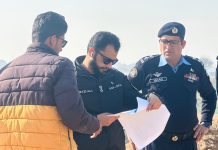By Asad Cheema
ISLAMABAD: Federal Minister for Communications Abdul Aleem Khan on Tuesday underlined Pakistan’s pivotal geo-strategic role in connecting South Asia, the Middle East, and Central Asia, stressing that regional trade corridors could transform landlocked states into land-linked economies
Addressing the Silk Way Transport Forum held in Almaty, Kazakhstan, he stated that the Islamabad–Tehran–Istanbul road link is of critical importance for Pakistan as well as the entire region, said a press release.
The minister highlighted that the China–Pakistan Economic Corridor (CPEC) flagship projects, like the Belt and Road Initiative which are aligned with Pakistan’s vision of achieving self-reliance and sustainable economic growth by 2030.
He added that CPEC is integrated with other regional corridors, including ECO and SCO initiatives, while Pakistan’s membership of TIR and the Quadrilateral Transit Agreement marks a milestone for regional connectivity.
Aleem Khan stressed that through trade corridors, landlocked states can be transformed into land-linked economies, while digital transformation is enhancing transparency in the communication sector. He underlined the strategic significance of Eurasia as the world’s largest landmass and reaffirmed Pakistan’s readiness to play its role in South Asia, Middle East and Central Asia. He remarked that turning international transport corridors into pathways of peace and prosperity is a shared responsibility but customs regulations and visa restrictions remain impediments to regional integration.
The Forum was attended by Transport Ministers from 12 countries including Türkiye, Iran, Uzbekistan, Turkmenistan, Azerbaijan, Kyrgyzstan, Georgia, Belarus, Russia, Latvia and Kazakhstan. The host, Kazakhstan’s Minister of Transport Mr. Nurlan Sauranbayev warmly welcomed the Pakistani delegation and extended generous hospitality to Federal Minister for Communications Abdul Aleem Khan.
On the sidelines, a high-level bilateral meeting was held between Federal Minister Abdul Aleem Khan and Kazakhstan’s Minister of Transport Nurlan Sauranbayev, accompanied by their respective delegations. Discussions focused on the initiation of direct flights, easing of travel procedures and issuance of multiple-entry visas especially for the business community.
Federal Minister Abdul Aleem Khan invited his Kazakh counterpart to attend the upcoming Regional Transport Conference in Pakistan scheduled for October 23–24 with participation from multiple countries.
He informed the meeting that the Karakoram Highway and Khunjerab Border remain operational on an annual basis from November while flood-damaged international highways have now been fully restored.
He reiterated that CPEC is not only vital for Pakistan but serves as the backbone of development for the entire region, expressing confidence that Kazakhstan can derive maximum benefits from CPEC and Pakistan’s seaports.
Federal Minister Abdul Aleem Khan further noted that both Pakistan and Kazakhstan are members of the Quadrilateral Transit Agreement while the proposed corridor of Kazakhstan, Turkmenistan, Afghanistan, Pakistan (KTAP) is a welcome initiative.
During the meeting, Transport Minister of Kazakhstan Nurlan Sauranbayev agreed on the establishment of a joint logistics company between NLC and KTZ Express, while Pakistan Post and KazPost expressed readiness to cooperate on E-Commerce and MoUs in this regard.
The Kazakh Minister reaffirmed commitment to strengthen future cooperation, acknowledging Pakistan as an important regional partner and assuring that bilateral relations will grow stronger in the years ahead.





